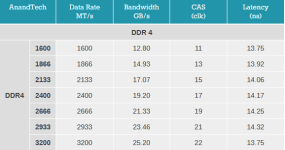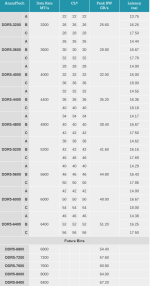With the move over to DDR5 next year and speeds of upto 8000+mhz, will we only need half as much ram to achieve the same benefit?
For example I currenty run 16gb 3200mhz DDR4. In future would I only need 8gb 6400mhz DDR5 to have the same performance?
No it doesn't work like that. The memory speed is primarily concerned with the time it takes to get program code and data from the memory onto the CPU.
DDR5 will only reduce the amount of time the CPU spends waiting for the next instruction (insert discussion of caches and pipelines here). Ultimately, the
code and data needs to be in RAM to be processed and if you run out of RAM the code and data will still be paged in and out from your disk; which
gives a huge hit in performance (even if that disk is an SSD).
As others have said, there's not going to be any sudden revolution in programming such that less memory will be needed.



